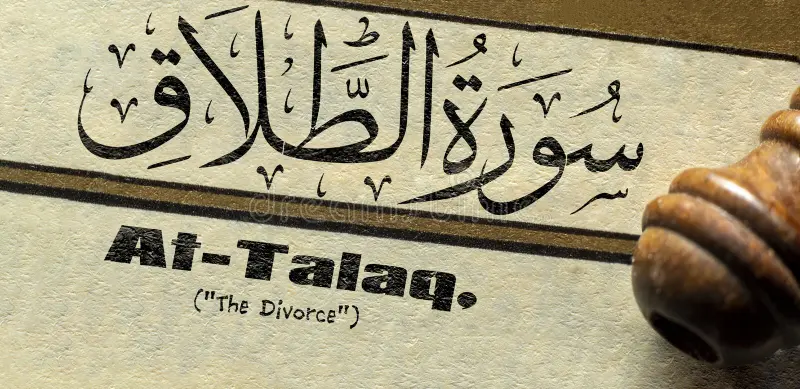Introduction
Surah At-Talaq (سورة الطلاق), translated as “Divorce,” is the 65th chapter of the Quran and plays a crucial role in Islamic family law. This Surah, revealed in Medina, provides detailed guidelines on the process and ethics of divorce, reflecting the Islamic principles of justice, fairness, and compassion. In this comprehensive analysis, we will explore the Surah’s verses, their implications for divorce and family law, and the ethical considerations embedded within the text.
Text and Translation
Verse 1: يَا أَيُّهَا النَّبِيُّ إِذَا طَلَّقْتُمُ النِّسَاءَ فَطَلِّقُوهُنَّ لِعِدَّتِهِنَّ ۗ ﴿۱﴾
O Prophet, when you divorce women, divorce them for [a period of] waiting.
Verse 2: وَٱلْعِدَّةُ ۡ لَا يَحِلُّ لَهُنَّ أَنْ يَخْرُجْنَ مِنْ بُيُوتِهِنَّ إِلَّا أَنْ يَأْتِينَ بِفَاحِشَةٍ مُّبَيِّنَةٍ ۗ ﴿۲﴾
And the waiting period should be counted from the time of divorce.
Verse 3: وَٱللَّهُ يَعْلَمُ مَا تُخْفُونَ وَمَا تُعْلِنُونَ ۗ ﴿۳﴾
And Allah knows whatever you reveal and whatever you conceal.
Verse 4: وَالْمُطَلَّقَاتُ يَتَرَبَّصْنَ بِأَنْفُسِهِنَّ ثَلَاثَةَ قُرُوءٍ ۗ ﴿۴﴾
Divorced women shall wait for three menstrual periods.
Verse 5: وَٱللَّهُ يَرْزُقُ مَنْ يَشَاءُ بِغَيْرِ حِسَابٍ ۗ ﴿۵﴾
Allah provides sustenance to whom He wills without account.
Verse 6: يَا أَيُّهَا النَّبِيُّ قُلْ لِأَزْوَاجِكَ وَبَنَاتِكَ وَنِسَاءِ ٱلْمُؤْمِنِينَ يُدْنِينَ عَلَيْهِنَّ مِنْ جَلَابِيبِهِنَّ ۗ ﴿۶﴾
O Prophet, tell your wives and your daughters and the women of the believers to draw their cloaks over them.
Verse 7: وَالْمُطَلَّقَاتُ يَتَرَبَّصْنَ بِأَنْفُسِهِنَّ ثَلَاثَةَ قُرُوءٍ ۗ ﴿۷﴾
Divorced women should wait for three menstrual periods.
Verse 8: فَأَمْسِكُوهُنَّ بِمَعْرُوفٍ أَوْ فَارِقُوهُنَّ بِمَعْرُوفٍ ۗ ﴿۸﴾
So either keep them in kindness or release them with kindness.
Verse 9: وَالْمُطَلَّقَاتُ يَتَرَبَّصْنَ بِأَنْفُسِهِنَّ ثَلَاثَةَ قُرُوءٍ ۗ ﴿۹﴾
And the divorced women should wait for three menstrual periods.
Historical and Jurisprudential Context
**1. Legal Framework for Divorce:
Surah At-Talaq establishes a legal framework for divorce in Islam, focusing on fairness and respect for both parties involved. The Surah addresses the procedural aspects of divorce, including the waiting period (iddah) and the treatment of women during this period. These guidelines were revealed to regulate the practice of divorce, ensuring that it is conducted in a just manner and that the rights of women are protected.
**2. Divorce Procedures:
The Surah outlines the procedures for divorce, emphasizing that it should be done in accordance with the waiting period specified in the Quran. The waiting period serves several purposes, including allowing time for reconciliation and ensuring that any potential issues related to pregnancy are resolved. The Surah also provides guidance on how to treat women during this period, reinforcing the importance of kindness and respect.
**3. Ethical Considerations:
Islamic teachings emphasize the ethical treatment of women during and after divorce. Surah At-Talaq highlights the importance of acting with fairness and compassion, prohibiting any form of mistreatment or exploitation. The Surah encourages maintaining dignity and respect for women, even in the context of divorce, and provides guidelines for ensuring their well-being.
Thematic Analysis
**1. Divine Guidance on Family Matters:
Surah At-Talaq reflects the Quran’s comprehensive approach to family matters, offering divine guidance on issues related to marriage and divorce. The Surah’s instructions are designed to promote harmony and justice within families, addressing common issues and conflicts that may arise.
**2. Protection of Women’s Rights:
The Surah underscores the importance of protecting women’s rights and ensuring their fair treatment. The waiting period (iddah) is designed to provide women with security and stability during the divorce process. The Surah also emphasizes that women should not be mistreated or subjected to unjust conditions.
**3. Ethics of Divorce:
The ethical principles outlined in Surah At-Talaq provide a framework for conducting divorce in a manner that respects the dignity of both parties. The Surah’s emphasis on kindness and fairness reflects the broader Islamic principles of justice and compassion.
Scientific and Philosophical Reflections
**1. Psychological Impact:
The ethical guidelines provided in Surah At-Talaq have implications for the psychological well-being of individuals undergoing divorce. The emphasis on kindness and respect can help reduce the emotional stress and trauma associated with divorce, promoting a healthier and more supportive environment.
**2. Social Justice:
Surah At-Talaq contributes to the broader principles of social justice in Islam. By ensuring that divorce is conducted with fairness and respect, the Surah helps to promote a just and equitable society where the rights of all individuals are upheld.
Practical Applications
**1. Guidance for Practitioners:
The Surah provides practical guidance for legal practitioners and counselors dealing with divorce cases. By following the principles outlined in the Surah, practitioners can ensure that divorce proceedings are conducted in accordance with Islamic teachings and that the rights of all parties are protected.
**2. Support for Individuals:
For individuals experiencing divorce, Surah At-Talaq offers reassurance and guidance. The Surah’s emphasis on fairness and respect provides a framework for navigating the challenges of divorce while maintaining dignity and honor.
Conclusion
Surah At-Talaq is a significant chapter in the Quran that addresses the principles and procedures related to divorce. Its guidance reflects the Islamic commitment to justice, fairness, and compassion in family matters. By providing a clear framework for divorce, the Surah helps to ensure that the process is conducted with respect for the rights and dignity of all parties involved. The ethical and legal principles outlined in Surah At-Talaq continue to provide valuable guidance for individuals and practitioners dealing with divorce and family issues.









